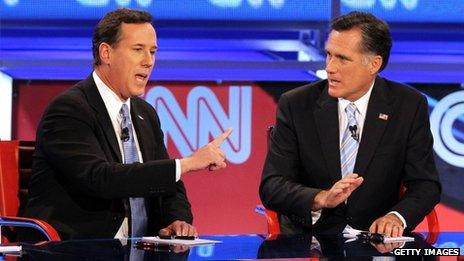A race to the right
- Published
- comments

The candidates each tried to prove they were the most conservative
CNN give their debates the big country build-up, shots of Arizona's rusty ranges, soft-focus cacti and the ominous fence along the Mexican border.
This might, just might, be the last Republican debate in a primary season dominated like no other by these set piece TV clashes.
This one was fast and furious, with the two main rivals of the moment Romney and Santorum repeatedly clashing.
Mitt Romney was the winner. The loser was probably the moderator Jon King, who said "fair enough" when Mitt refused to answer a question about the biggest misconception about him.
Romney was helped in general by an audience that seemed completely on his side. Whether on stage giving a speech or meeting a crowd Romney often seems unhappy in his own skin, an actor not quite at ease in his role. But in debates he shines, confident and well prepared.
By contrast Rick Santorum was nervous, tripping hesitantly over his own words, often missing openings in his opponents argument. He was booed, from time to time, by the pro-Romney audience.
Newt Gingrich was solid, ploughing on like a tank, never missing an opportunity to fire on President Obama.
Ron Paul was Ron Paul, feisty, courageous and a touch eccentric, the only one to insist on positions he believes to be true, even when the audience doesn't like them.
The candidates were asked to define themselves in one word. Romney said "resolute", Santorum "courageous", Paul "consistent". The grim-faced and often angry Newt went last - "cheerful". As someone tweeted at the time, three of them made themselves sound like names for battleships. Gingrich made the best joke in a night short of laughs.
The audience booed when a question was asked on contraception, but it got all the men very excited. Santorum made a passionate argument that contraception led to teenage pregnancy and Romney seem to claim it was all really about gay marriage.
Race to the right
There is something very odd about these debates. In all the hours and hours of to and fro you learn almost nothing new about the candidates' ideas. You certainly learn how much contempt they hold for the president, how dangerous they think he is and how scathing they can be about him.
Take the question on Syria, perhaps the most pressing foreign policy question at the moment. It was straightforward: "Would you arm the rebels?" Romney came closet to a real answer, saying he would encourage Assad's ethnic group to break away from him, and urge Turkey and Saudi Arabia to arm the rebels. Ron Paul was against foreign involvement. The other two waffled about how it was all about Iran and how weak Obama was.
Maybe they don't know enough to answer the question sensibly. More likely they don't want to risk an answer that could be a hostage to fortune or might not be liked by Republican voters. Neither are great qualifications for being president.
Or take Iran itself. The most serious foreign policy question of the moment. They were all pretty forthright about the danger of the country getting nuclear weapons and again Obama's weakness. Their talk was pretty warlike. But there was no grown-up plan, no suggestion of ultimatums, or whether the bombers should be in the air tomorrow, or whether Israel should go it alone.
That is because these debates are about one thing. A race to the right. Each candidate's single purpose is to demonstrate he is the most conservative person on that stage. The most hawkish. The most against government. The most against spending.
The passion only flows when they have to defend something in their past that may look a bit moderate. It is understandable, and there is nothing intrinsically wrong with this when many Republicans feel their party has been sold out, and betrayed by those with insufficient ideological rigour. But it doesn't suggest they could show much independence of mind in office.
It is about winning this fiercely contested primary, and nothing else. Vigorous protestations of ideological purity, like Mitt's insistence he is a "severe, strict conservative" sound like an outtake from a trial by a Puritan sect or Mao's cultural revolution. More like a suspected apostate trying to prove their belief is genuine than someone who wants to lead a democratic political party to an election victory.